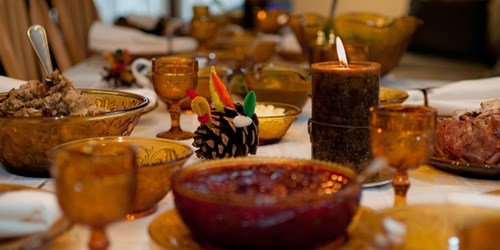
At dining room tables and in kitchens across America, families will take a few moments today to pause and pray before devouring the feast before them.
Have you ever wondered why we do this? Or what to say? Whether your family “says grace,” “gives thanks” or “blesses the food,” here are three reasons we pray before meals.
1. To celebrate who God is
God is a giver. God is generous. Every time we bow our heads, it’s an opportunity to express gratitude for God’s character. King David, one of the leaders of Israel, gives us a great example of what this looks like.
God put it on David’s heart to build a temple. To accomplish this task, the nation would need money, supplies, and skilled craftsmen to do the work. David asked everyone to give as they felt led, and the response was overwhelming! To celebrate, King David gathered the whole nation for a massive feast. Before they ate, David stood before the people and prayed:
“Blessed are you, O Lord, the God of Israel our father, forever and ever. Yours, O Lord, is the greatness and the power and the glory and the victory and the majesty, for all that is in the heavens and in the earth is yours. Yours is the kingdom, O Lord, and you are exalted as head above all” (1 Chronicles 29:10-11).
Celebrating God’s greatness is one way we tell Him we love Him.
David starts his blessing by celebrating who God is. God loves hearing us tell Him what a good father He is just like we love it when our kids tell us what good parents we are. Celebrating God’s greatness is one way we tell Him we love Him. It also puts us in our place. When we recall how powerful and majestic God is, we remember how small and dependent on Him we are.
2. To remember who provides for us
God made everything. Whatever we have, God gave us. David understood that God is our provider, so before digging into the feast, he wanted to make sure Israel understood this as well:
“Both riches and honor come from you, and you rule over all. In your hand are power and might, and in your hand it is to make great and to give strength to all… who am I, and what is my people, that we should be able thus to offer willingly? For all things come from you, and of your own have we given you” (1 Chronicles 29:12-14).
This feast was not about celebrating Israel’s wealth, but God’s generosity. The same is true for us. The turkeys we carve are gifts from God. The homes eat in are gifts from God. He alone deserves the credit for it all, and when we understand that, it only feels natural to give Him thanks.
Taking a day to recognize how blessed we are is a good thing, but living each day with gratitude is a God thing.
3. To redirect our hearts
After recognizing that God is great and He gives everything, David makes one ask: God, please don’t ever let us forget either one of those truths.
“I know, my God, that you test the heart and have pleasure in uprightness. In the uprightness of my heart I have freely offered all these things, and now I have seen your people, who are present here, offering freely and joyously to you. O Lord, the God of Abraham, Isaac, and Israel, our fathers, keep forever such purposes and thoughts in the hearts of your people, and direct their hearts toward you” (1 Chronicles 29:17-18).
Taking a day to recognize how blessed we are is a good thing, but living each day with gratitude is a God thing. That’s what David wanted for his people, and that’s what God wants for us. How would it change our attitude to life if we prayed with the same earnestness we have on Thanksgiving 365 days a year?